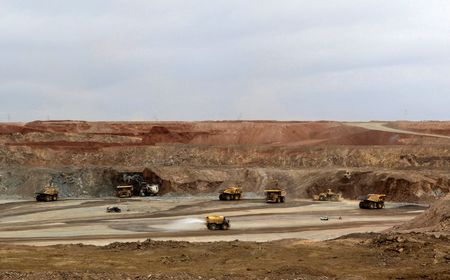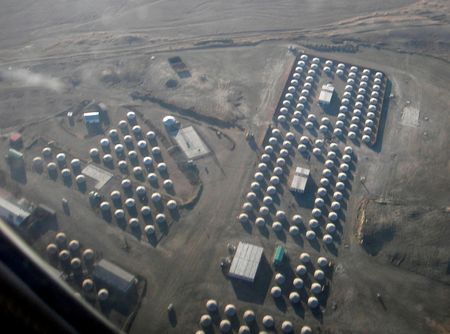 1
1 1
1


By Ernest Scheyder
HOUSTON (Reuters) -Rio Tinto Ltd is working to maintain steady supplies of fuel and other goods for its Mongolian copper operations from suppliers that buy from Russia and elsewhere, a top executive at the mining giant said on Wednesday.
The Anglo-Australian company is developing Mongolia’s Oyu Tolgoi, one of the world’s largest known copper and gold deposits. Rio controls about two-third of the project, with Ulanbaatar controlling the rest.
While Rio has begin looking for alternative fuel sources for Oyu Tolgoi, the company does not believe it can stop buying from Russia altogether, Bold Baatar, head of Rio’s copper business, said on the sidelines of the CERAWeek energy conference in Houston. Rio has supply agreements for a host of products with Mongolian suppliers, many of whom procure materials from Russia.
“The reality is, Mongolia has two very big powerful neighbors, so it’s quite important for us to maintain healthy, peaceful, balanced relationships,” Baatar said of his home country.
Mongolia is bordered on the north by Russia and on the south and east by China, leaving Rio few options to secure supplies for the project, which is set to be the world’s third-largest copper mine.
Amid Russia’s invasion of Ukraine, multiple companies and countries have announced they will stop business in Russia and buying Russian products.
Baatar said it would be “very difficult” for Rio’s Mongolian operations to stop all imports from Russia, adding that some supplies come through Russia via Kazakhstan.
“That kind of supply is fine unless the world wants to completely shut the Russian borders, which is not possible,” he said.
Rio in January ended a long-running feud with Mongolia’s government over control of Oyu Tolgoi. The deal marked a positive development for the company, which is facing major pushback for projects in Serbia, the United States and Guinea.
Baatar appeared on a copper panel at the conference alongside Richard Adkerson, chief executive of Freeport-McMoRan Inc and Trafigura’s Julien Rolland.
Baatar told the panel that it was “pretty imperative” for the United States to develop more copper mines to supply copper needed for electric vehicles and renewable energy technologies. Rio is trying to develop the Resolution Copper project in Arizona, but has faced Native American opposition.
Mining companies “should respect the wishes of communities, and many communities don’t want to see mining,” Baatar said.
When asked what that meant for the Arizona project, Baatar said he believes an agreement can be reached with local Native Americans.
“I completely respect their views of the project and I’m really hopeful we can find a mutual, common solution,” he said.
(Reporting by Ernest ScheyderEditing by Marguerita Choy)